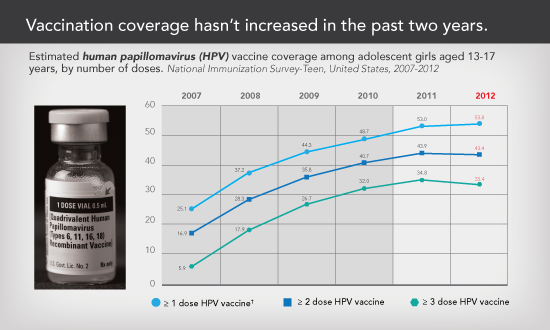Just last month we had great news for Americans. Infection with the types of human papillomavirus (HPV) that commonly cause cervical cancer in women has dropped about half in 14- to 19-year old girls since the HPV vaccination program started.
The vaccine works. It works even better than we had hoped.
The vaccine is safe. There've been over 57 million doses given without identifying any serious safety concerns.
The vaccine is effective. How often can we say we have something we know can protect the next generation against cancer?
But last week we published a study showing that HPV vaccination coverage hasn't increased at all in the past two study years.
We're dropping the ball.
When we ask parents why they aren't making sure their 11- and 12-year-olds are getting the vaccine, many say their doctor didn't recommend it.
The strongest predictor of whether a kid gets the HPV vaccine is doctor recommendation.
Rwanda has more than twice the vaccine rate of the U.S. Every day we don't increase our rates to Rwanda's, more than 100 girls are being doomed to cervical cancer.
Doctors and other health care providers: Don't miss a single opportunity to vaccinate your patients.
For many, it's easier than ever to get the HPV vaccine. Because of the Affordable Care Act, most private health insurance plans will cover the HPV vaccine with no co-pay or deductible.
In addition, the Vaccines for Children program provides vaccines for children 18 and younger who are under-insured, not insured, Medicaid-eligible or American Indian/Alaska Native.
HPV vaccine: the anti-cancer vaccine.
